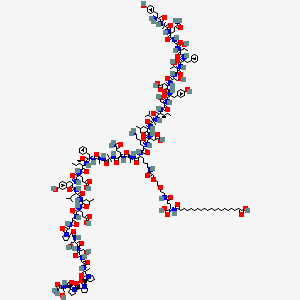Retatrutide Information
Click here to view all Retatrutide productsThe information, including but not limited to, text, graphics, images and other material contained on this website are for informational purposes only. No material on this site is intended to be a substitute for the consultation, diagnosis, and/or medical treatment of a qualified physician or healthcare provider.

Retatrutide (also known by its development code LY-3437943) is an experimental drug being developed primarily for the treatment of obesity and Type 2 diabetes. It is not yet approved by the FDA or other regulatory bodies and is currently in Phase 3 clinical trials.
It is considered a major advancement because of its triple-action mechanism.
How Retatrutide Works: Triple-Action Agonist
Retatrutide is a triple hormone receptor agonist. This means it is a single molecule that mimics the actions of three different natural hormones in the body that are involved in regulating blood sugar and appetite:
1- Glucagon-like peptide-1 (GLP-1) Receptor Agonist:
- Action: Slows down gastric emptying (how quickly food leaves the stomach), which makes you feel fuller for longer.
- Effect: Suppresses appetite and helps regulate blood glucose by stimulating insulin release in a glucose-dependent manner.
2- Glucose-dependent insulinotropic polypeptide (GIP) Receptor Agonist:
- Action: Also enhances glucose-dependent insulin secretion and helps the body process fat (lipid metabolism).
- Effect: Further helps to lower blood sugar and contributes to reducing appetite and overall energy balance.
3- Glucagon (GCG) Receptor Agonist:
- Action: Glucagon primarily raises blood sugar, but its agonism in the context of Retatrutide's triple action promotes the breakdown of stored fat.
- Effect: Stimulates the body to burn fat for energy (lipolysis) and increases overall energy expenditure (calorie burning).
By hitting all three pathways, Retatrutide is designed to provide a comprehensive effect, integrating signals that reduce appetite, improve insulin sensitivity, and promote energy expenditure concurrently.
Synonyms of Retatrutide
- Retatrutide
- 2381089-83-2
- orb1981169
- EX-A7826E
- GTPL13769
External Sources about Retatrutide
- Phase 2 Trial Results in The New England Journal of Medicine (NEJM)
- Eli Lilly's Press Release on Phase 2 Retatrutide Results (June 2023)
- ClinicalTrials.gov: Retatrutide (LY3437943) in Obesity (TRIUMPH-1, Phase 3)
- ClinicalTrials.gov: Retatrutide on Cardiovascular Outcomes (TRIUMPH-Outcomes, Phase 3)
- Retatrutide (GIP, GLP-1 and glucagon receptor agonist) for people with type 2 diabetes (Phase 2 Trial in The Lancet)

